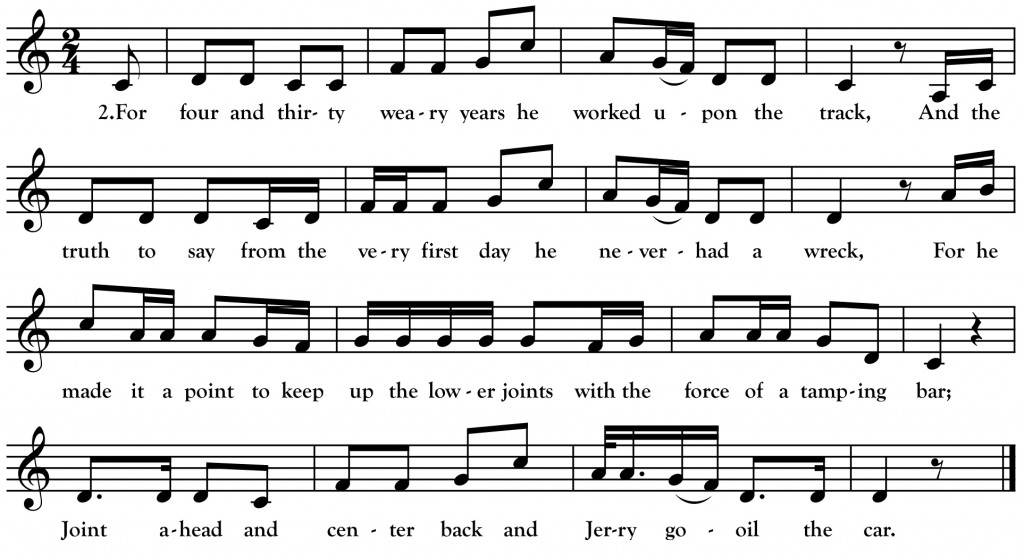Jerry Go Oil the Car (Laws H30)
Come, all you railroad section hands, I hope you will draw near,
And likewise pay attention to these few lines you’ll hear,
Concerning one Larry Sullivan, alas, he is no more,
He sailed some forty years ago from the green old Irish shore.
For four and thirty weary years he worked upon the track,
And the truth to say from the very first day he never had a wreck,
For he made it a point to keep up the lower joints with the force of the tamping bar;
Joint ahead and center back and Jerry go oil the car.
To see old Larry in the winter time when the hills were clad with snow,
It was his pride on his handcar to ride as over the section he’d go,
With his big soldier coat buttoned up to his throat, sure he looked like an Emperor,
And while the boys were shimming up the ties, sure Jerry would be oiling the car.
When Sunday morning came around to the section hands he’d say,
“I suppose you all know that my wife is going to Mass today,
And I want every man for to pump all he can, for the distance it is very far,
And I’d like to get in ahead of number ten, so Jerry go oil the car.”
“And now when my friends are gathered around, there is one request I crave,
When I am dead and gone to my rest, place the handcar on my grave;
Let the spike mawl rest upon my breast with the gauge and the old clawbar,
And while the boys are lowering me down, lave Jerry to be oiling the car.”
“Give my regards to the roadmaster,” poor Larry he did cry,
“And rise me up so I may see the handcar before I die.”
He was so wake he could hardly spake, in a moment he was dead;
“Joint ahead and center back,” were the very last words he said.
Remarks by Mrs. Sullivan:
God bless you, Larry Sullivan, to me you was kind and good,
For me you’d make the section hands go out and cut the wood,
To the well also for water they would go, and chop the kindling fine,
And if any of them would growl, upon my soul, he’d dam soon get his time.
And now that he is dead I want it to be said that the cars they never got a jar;
Joint ahead and center back and Jerry go oil the car.
———————————————————————-
In his memoir about growing up in Cloquet, MN in the early 1900s, Walter O’Meara recalls stories told by his father Michael O’Meara, a life-long lumberman who was born in Ontario to Irish parents. One story concerns Scotty Boyle, a foreman on the Embarrass River:
In Scotty’s camp…the crew was not awakened, as in other camps, by the raucous notes of the long tin horn called the “gabrel.” No indeed. “Give ‘em Larry,” Scotty would say to a young Irishman on his crew, and the men were apprised of the dawn of a new day in the pines by the sweet strains of “Larry O’Sullivan.”[1]
Minnesota singer Mike Dean called the song by its other common name, “Jerry Go Oil the Car.” Above is the text from Dean’s songster The Flying Cloud including his own note that the last 1½ stanzas are the words of “Mrs. Sullivan.” The melody is as sung by Dean on a recently rediscovered 1924 wax cylinder recording made by Robert Winslow Gordon. Gordon recorded Dean’s first verse on one cylinder and then the 2nd and 3rd verses on a separate cylinder and the melody, though a version of “The Star of the County Down” in both cases, is considerably different between the two recordings. I give the verse 2 & 3 melody here. Gordon’s recordings show that Dean sang the song with a noticeable Irish brogue. He flips some Rs, oil becomes “ile” and emperor is “emporarr.”
Mike’s brother Charles Dean lived most of his life in the Twin Cities and, like millions of Irish-Americans across the US in the late 1800s, was a railroad worker for most of his life. Mike would have been quite familiar with railroad men himself as he ran a string of saloons and hotels across the street from the St. Paul and Duluth Depot in Hinckley, a common dinner stop for trains between St. Paul and Duluth.
_________________________________________________
More detailed information on this song from the Traditional Ballad Index

